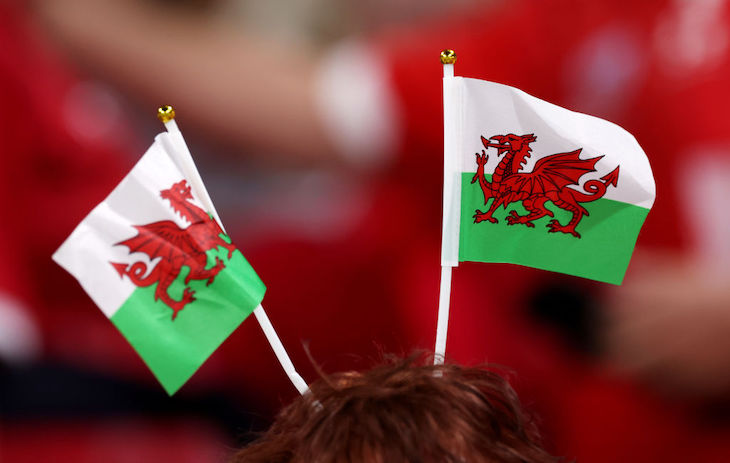Heard the joke about the Englishmen, Irishmen and Scotsmen? They have all been selected for the British and Irish Lions squad to face Australia in Brisbane today. At the expense of the Welshman.
The fact that no Welshman has been included among the 23 players chosen for the first of three Test matches is further confirmation of the diminishing stock of Welsh rugby. The last time a Lions matchday squad had no Welsh representation was in 1896.
Welsh rugby players once blamed the English for the ills of their country, but the damage done to their sport this century is home-grown
When in May, Lions’ coach Andy Farrell named his 38 players for the tour of Australia there were fifteen Irishmen, thirteen Englishmen, eight Scots and two Welshmen – their lowest representation since 1903. One of that pair, scrum-half Tomas Williams, tore his hamstring in the first match in Australia and returned home, leaving flanker Jac Morgan as the only Welshman Down Under.
Morgan didn’t make the squad for Saturday’s first Test and will watch the match from the stand, along with thousands of Welsh rugby fans who are in Australia for the series. It wasn’t so long ago that Welsh Lions fans had much to celebrate; the last time the Lions played a series in Australia – in 2013 – eight of the starting XV for the first Test were Welsh.
In the twelve years since, however, Welsh rugby has become a shambles on and off the pitch. So far have they fallen that there was jubilation in the valleys when they beat Japan. That win last week ended an 18-match losing streak, a run that started in the autumn of 2023.
They went through the 2024 and 2025 Six Nations without a win, and in this year’s championship they were thrashed 43-0 by France and humiliated 68-14 in Cardiff against England. It was Wales’ heaviest home defeat and their biggest loss in Six Nations history.
There was a time when Englishmen quaked in their boots at the thought of a trip to Cardiff. In the 1977 Five Nations, Wales captain Phil Bennett fired up his team in the dressing room by telling them: ‘Look what these bastards have done to Wales. They’ve taken our coal, our water, our steel…We’ve been exploited, raped, controlled and punished by the English – and that’s who you are playing this afternoon.’
That was the period when Welsh rugby was at its most dominant. Between 1964 and 1979, they lost only once to England. They produced some of the greatest players in the history of rugby – Bennett, Gareth Edwards, Barry John and Mervyn Davies – and won three Five Nations’ Grand Slams in the 1970s.
Welsh rugby in this period was unique among its British and Irish rivals in that it was the sport of the working-class. It was played by miners, steel workers and dockers, forging an identity and a pride to towns such as Neath, Bridgend, Maesteg and Pontypool.
‘There used to be a time when the Welsh selectors could whistle down any mine shaft in the country and up would come a new pack,’ reflected a Wales newspaper in 2005.
These packs of forwards were hard men, harder than anything the English could produce, whose players were mostly products of public schools. But those days are long gone, along with the mines. The last Welsh rugby international who worked down the mines was Garin Jenkins, a regular in the team during the 1990s.
That was the decade when rugby union turned professional. In the amateur era, Wales punched above its weight, but professionalism motivated France and England to maximise their far greater resources. They still struggle to make the most of their potential, unlike Ireland, who have gone from the Five Nations’ whipping boys of the 1980s and 1990s to Europe’s pre-eminent side in recent years. Wales have gone in the other direction.
If the deindustrialisation of Wales had a devastating effect on grassroots rugby, so has the chronic mismanagement of the professional game by the Welsh Rugby Union (WRU). So widespread was the chaos in 2023 that it even made the New York Times, in an article headlined ‘A Year in Crisis Takes Its Toll on Welsh Rugby’. All the charges against the WRU were aired: from accusations of a toxic work environment to financial ineptness.
But perhaps the greatest fault of the WRU is the one that many hold responsible for the nation’s demise as a rugby powerhouse. In 2004, the WRU restructured schools and youth rugby in Wales, unnecessarily tinkering with a system that for decades had produced a conveyer belt of talent for senior rugby.
Welsh rugby writer Huw S Thomas says that, as a result, ‘the Welsh schools became toothless and the Saturday leagues petered out, with 100 youth teams believed to have disappeared in the past 20 years’.
How many youngsters have slipped through the rugby net in these years, turning instead to football – which has enjoyed a surge in popularity recently, thanks to the success of the Wales team – or loafing on their sofa playing video games?
Welsh rugby players once blamed the English ‘bastards’ for the ills of their country, but the damage done to their sport this century is home-grown. Welsh rugby needs a root-and-branch reform. If things don’t change, when the Lions next tour, to New Zealand in 2029, the Welsh representation may have decreased from one to zero.








Comments